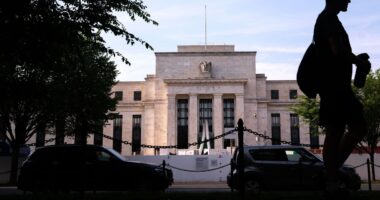
The Federal Reserve will soon begin selling off the corporate bonds and exchange-traded funds it amassed last year through an emergency-lending vehicle set up to contain the Covid-19 pandemic’s economic fallout.
The vehicle, known as the Secondary Market Corporate Credit Facility, or SMCCF, held $5.21 billion of bonds from companies including Whirlpool Corp. , Walmart Inc. and Visa Inc. as of April 30. In addition, it held $8.56 billion of exchange-traded funds that hold corporate debt, such as the Vanguard Short-Term Corporate Bond ETF.
A Fed official said the sales should be completed by the end of this year. Net proceeds will be remitted to the Treasury Department.
The Fed’s corporate-debt holdings are distinct from its $7.3 trillion balance sheet of Treasury securities and agency mortgage-backed securities. The central bank under Chairman Jerome Powell is continuing to purchase those types of assets to the tune of at least $120 billion a month as part of its monetary-policy goal of holding down borrowing costs until the economy recovers further from the pandemic.
The SMCCF was set up in March 2020 as part of a broader suite of programs established by the Fed and Treasury to shore up liquidity in financial markets. Stock and bond markets at the time were reeling from the fear and uncertainty regarding the coronavirus and economic lockdowns to contain it.
The Fed’s announcement of the SMCCF and a related vehicle, the Primary Market Corporate Credit Facility, quickly restored investor confidence in major corporations’ ability to issue debt. As a result, the latter vehicle never made a purchase, and the SMCCF’s holdings peaked at around $14.2 billion last year, a far cry from the two programs’ combined $750 billion of firepower.
“The SMCCF proved vital in restoring market functioning last year, supporting the availability of credit for large employers, and bolstering employment through the Covid-19 pandemic,” the Fed said in a statement Wednesday.
The corporate-credit programs stopped buying assets on Dec. 31 after then-Treasury Secretary Steven Mnuchin declined to extend several of the Fed’s emergency lending programs.
In Wednesday’s statement, the Fed said it plans to sell the bonds and ETF holdings in a gradual and orderly way that seeks to minimize “the potential for any adverse impact on market functioning.”
The New York Fed, which manages the SMCCF, will provide additional details soon and before sales begin, the statement added.
Write to Paul Kiernan at [email protected]
Copyright ©2020 Dow Jones & Company, Inc. All Rights Reserved. 87990cbe856818d5eddac44c7b1cdeb8









